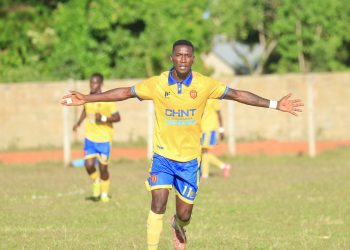The Chairman of the National Council of Sports (NCS), Ambrose Tashobya, has emphasized the need for strategic planning, development of sports infrastructure, and community engagement to ensure the long-term sustainability of sports franchises in Uganda.
Appearing on NBS Sport’s “Sport This Evening” program on Monday, July 8, Tashobya shared his insights when asked to comment on the relegation of the once-mighty Dmark Power from the National Basketball League (NBL).
Tashobya, a basketball enthusiast, former player, and past FUBA president, stressed the importance of strategic planning, stating, “I think it speaks to the fact that we have to plan for our basketball franchises to be self-sustaining and be brands that can attract some money.”
“The only way you can stay at the top is to be able to fund the vision that you have as a club,” he added.
Tashobya highlighted the critical role of sports infrastructure and strong administrative practices in attracting fans and generating revenue.
“We need to have sports infrastructure because it is one of the ways we can draw fans to the game. And if the fans ultimately get attached to the club, you can get some money from them,” he explained.
He called for sports franchises to have robust administrative structures, pointing to the JT Jaguars as an example of a club that thinks outside the box and plans effectively.
“But also, some of our clubs need to be strong administratively and be able to plan outside the box, just like the way JT Jaguars are doing,” he said.
Beyond the financial and administrative aspects, Tashobya stressed the importance of sports teams leaving a lasting impact on their communities. He argued that nurturing young talent and fostering community engagement can be more significant than merely winning trophies.
“Teams need to also be impactful in the community. They need to turn kids into professional players. Some of these things are more important than winning a trophy,” Tashobya noted.
The shocking relegation of Dmark Power, one of Uganda’s most storied basketball clubs, marked a significant moment in the NBL.
Power were relegated to the first division on June 20, following their 61-52 loss to Livingstone at YMCA in Wandegeya. The once-big team had only six wins from 22 games and ended the season in 11th place.
Tashobya also commented on the Kyambogo Warriors, the 2012 NBL champions who have struggled to regain their former glory since their relegation.
Despite their current obscurity, Tashobya assured fans that the Warriors are still active and poised for a comeback.
“Yes, there’s still a franchise called Warriors. And they have big plans, maybe bigger than what other clubs have, so they’ll come back and most likely with big news hopefully next year,” he revealed.
During the show, Tashobya also reminisced about his days with the City Oilers, recounting how he helped the team rise to prominence in the NBL.
Initially hesitant to play in the third division, Tashobya eventually joined the Oilers and played a pivotal role in their promotion to the top division.
“The time City Oilers were joining the league, we used to play at Kabira, they called me to play with them in the league but I said I can’t play in the third division, I’m the president of the Federation (FUBA),” he recounted.
“So one year later, I’m in Tanzania working on some projects and Hajji (Mohamed Ghedi Santur, City Oilers president) calls me and tells me we’ve qualified for the 2nd division. I said that I have to play,” he continued.
“I played the whole year for them, I was the second-best scorer and second-best rebounder, and I played maybe three-quarters of the matches in the league and they were promoted to the top division and never came down,” he concluded.





























